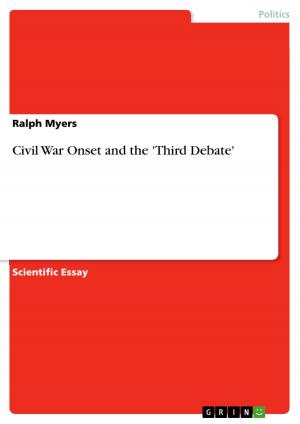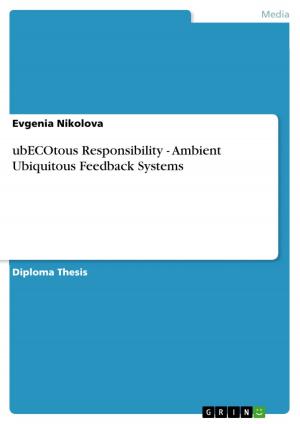Alfred Schopf's account of the past tense on the basis of Reichenbach's theory
Nonfiction, Entertainment, Drama, Anthologies| Author: | Michael Treichler | ISBN: | 9783638275651 |
| Publisher: | GRIN Publishing | Publication: | May 12, 2004 |
| Imprint: | GRIN Publishing | Language: | English |
| Author: | Michael Treichler |
| ISBN: | 9783638275651 |
| Publisher: | GRIN Publishing |
| Publication: | May 12, 2004 |
| Imprint: | GRIN Publishing |
| Language: | English |
Seminar paper from the year 2004 in the subject English Language and Literature Studies - Linguistics, grade: 1-2 (A-B), Carl von Ossietzky University of Oldenburg (Seminar for Anglistics), course: Hauptseminar 'Semantics of Tense', language: English, abstract: With the presentation of his theoretical model for the semantic analysis of tenses, Hans Reichenbach (1947: 287 - 298) supplied to linguistic research a tool that has since then been made use of in a large number of publications. His model, consisting of the three core elements point of speech (S), point of event (E), and point of reference (R), has been widely accepted to constitute an appropriate theory for the analysis of the English verbal tenses. Nevertheless, since its first publication, several attempts and proposals for modifications on Reichenbach's model have been presented. In most of these works, the focus is pointed on research on the past tense. A large number of linguists as well as logicians have proposed modifications concerning different temporal extensions of both reference and event time, interpretations of these two times in terms of definite and indefinite points in time, their relation to each other, and, finally, successive reference points in sentence sequences. Therefore, when Alfred Schopf (1987) presents his proposal, it has a basis of a long tradition of earlier works containing different views and proposing different approaches which can either be followed or rejected. In this paper, Schopf discusses three aspects of the use of the English past tense and refines Reichenbach's analysis of this tense. First, Schopf explains the information conveyed by an isolated past tense sentence by interpreting it in terms of a search instruction. Secondly, he contributes to the discussion about the progression of the point of reference in a sequence of sentences. Finally, Schopf presents his proposal for an account of the use of the past tense in substitutionary speech. The aim of the present paper will be to discuss Schopf's approaches in comparison to Reichenbach's model. It will be attempted to demonstrate which elements of Reichenbach's account have been left unchanged by Schopf and which elements, on the other hand, have been modified by him. Since not all parts of Schopf's analysis have their origin in Reichenbach's theory, it will furthermore be discussed in which way he adds modules of other approaches to Reichenbach's model and also introduces own proposals. Furthermore, each aspect of Schopf's approach will be discussed for its ability to fulfil the aims Schopf sets in his paper.
Seminar paper from the year 2004 in the subject English Language and Literature Studies - Linguistics, grade: 1-2 (A-B), Carl von Ossietzky University of Oldenburg (Seminar for Anglistics), course: Hauptseminar 'Semantics of Tense', language: English, abstract: With the presentation of his theoretical model for the semantic analysis of tenses, Hans Reichenbach (1947: 287 - 298) supplied to linguistic research a tool that has since then been made use of in a large number of publications. His model, consisting of the three core elements point of speech (S), point of event (E), and point of reference (R), has been widely accepted to constitute an appropriate theory for the analysis of the English verbal tenses. Nevertheless, since its first publication, several attempts and proposals for modifications on Reichenbach's model have been presented. In most of these works, the focus is pointed on research on the past tense. A large number of linguists as well as logicians have proposed modifications concerning different temporal extensions of both reference and event time, interpretations of these two times in terms of definite and indefinite points in time, their relation to each other, and, finally, successive reference points in sentence sequences. Therefore, when Alfred Schopf (1987) presents his proposal, it has a basis of a long tradition of earlier works containing different views and proposing different approaches which can either be followed or rejected. In this paper, Schopf discusses three aspects of the use of the English past tense and refines Reichenbach's analysis of this tense. First, Schopf explains the information conveyed by an isolated past tense sentence by interpreting it in terms of a search instruction. Secondly, he contributes to the discussion about the progression of the point of reference in a sequence of sentences. Finally, Schopf presents his proposal for an account of the use of the past tense in substitutionary speech. The aim of the present paper will be to discuss Schopf's approaches in comparison to Reichenbach's model. It will be attempted to demonstrate which elements of Reichenbach's account have been left unchanged by Schopf and which elements, on the other hand, have been modified by him. Since not all parts of Schopf's analysis have their origin in Reichenbach's theory, it will furthermore be discussed in which way he adds modules of other approaches to Reichenbach's model and also introduces own proposals. Furthermore, each aspect of Schopf's approach will be discussed for its ability to fulfil the aims Schopf sets in his paper.















